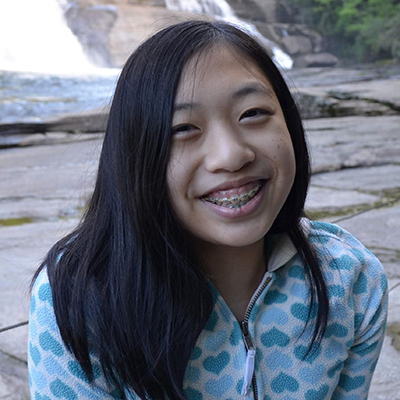
My father and sister are software developers, but I didn’t get interested in computing until my freshman year in college, when taking an introductory computer science class as a prerequisite to the biostatistics major. I was drawn to the flexibility and creative problem-solving involved in coding and wanted to learn how to use it to better others' lives. I eventually became an undergraduate teaching assistant for that class and got involved with research in applying computer science to aid those with disabilities. Later, I worked for a couple years as an intern conducting data analysis and automation for the education division of SAS institute. Thus began my journey in computer science.
One strength of computer science is its applicability to every field! As I am especially passionate about health, education, and accessibility, I hope to combine my majors (computer science and public health nutrition) to conduct computer science research leveraging insights from both fields to advance knowledge of biologically-inspired technology and develop technology to empower those with disabilities. Ultimately, I plan to pursue a PhD in computer science and become a professor at a university, where I hope to be a role model for others as a woman of tech in disability.
I have spina bifida, tethered spinal cord, and scoliosis, and I use a wheelchair to get around. While I never consciously chose to be involved in health because of my disability, living with a chronic condition brought me into the world of accessibility. I currently serve as secretary of a disability advocacy club at my school and am involved in a variety of disability and accessibility research both inside and outside of computing. Most recently, I've been leading an open-source initiative for my senior honors thesis to create accessible maps for campus. One takeaway from my story is that while my disability does not define me, it is an inextricable part of me that God has worked through to let me reach others.
Explore, and never be afraid to try new things and ask questions! Seek advice from mentors, take coding courses, and leverage free resources for learning coding online. Then try your hand at a project that relates to something YOU are passionate about. Whether or not you ultimately decide to go into computing, the hard and soft skills you learn will be invaluable!
There are many reasons why one might go into computing, and you should find a field with a “why” that resonates with you! Personally, I am drawn to computer science, partially because I love to be challenged, to knit patterns into programs and poetry. But what anchors my passion for the field is not just the joy of learning and creating, but the ability to give back to the community through teaching and through collaborative research that addresses real-world problems, to the glory of God. I think the beauty of computer science lies in its ability to touch the intangible, opening up galaxies of thought and creation for us to step through together. I also think that even if you don't choose to go into computing, the critical thinking, logical, and problem-solving skills (as well as programming knowledge) you take away from taking even an introductory course is invaluable in any field. For these reasons, I'd greatly encourage exploring studying computing!